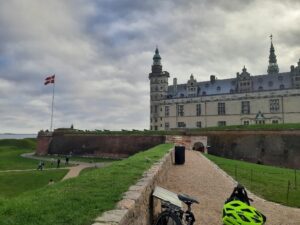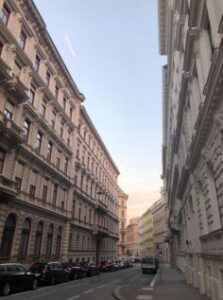Kategorie: ‘Course of Study’
Wonderful time in Vienna
- Medicine
- Austria, Vienna
- Universität Wien
- 03/2023 – 07/2023
1. Application/Internship search
My journey began 2 years ago, when I considered doing a tertial of my practical year abroad. I had already done an internship in gynaecology in Vorarlberg and really liked the system and the friendliness. Vienna was also not completely unknown to me from visits and so I decided to go to Vienna. Also, because it was a perfect fit with German as the national language and the hospital system is of a similar standard to Germany. So, I was able to find my way around quickly in my first few weeks and had no problems with a language barrier.
Now, it should be noted that you should plan early if you decide to go to Vienna. Places are in high demand and, with around 600 students a year from MedUni alo
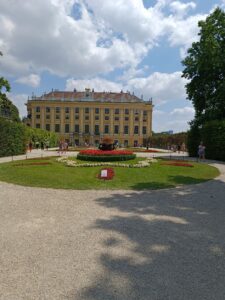
Schönbrunn Palace
© Lea Victoria Eckstein
ne, they are quickly filled. So, I started looking for a suitable hospital with the help of an online website and the PJ list of my state examination office. Ideally, it should already be recognised and a teaching hospital of the University of Vienna. That’s how I found the Franziskusspital Margareten, the former Hartmannspital. Maybe not outstanding in terms of size, but with its very own charm. I applied for a place in surgery, as this was one of the compulsory tertials in our PJ and relatively easy to complete abroad. I received positive feedback and was really looking forward to my time in Vienna.
The waiting time seemed long. Especially because the last information and documents were only sent shortly before the start. Not to mention that there were still problems with the recognition, because the “Landesprüfungsamt” requires a separate document for foreign tertials, which the University of Vienna does not sign. Instead, they issued a different document, which fortunately was recognised after a few exchanges of emails from the university PJ coordinators. Now, hopefully, nothing stood in the way of my stay, and I thought about suitable accommodation, travel health insurance and my financial situation. Since the practical year is generally not very well paid, I looked for options. I found an online article about the possibility of applying for an Erasmus+ scholarship, which was to be awarded specifically for internships. So, I tried my luck, and it took quite a bit of written arrangements, various emails and 2 application processes, but it was worth it. In January, 2 months before my stay abroad, I received feedback that my internship would be funded by the Erasmus+ programme of my university and that the University of Vienna also accepted my application within this framework and enrolled me as a temporary student.
This meant that I could register as a student in Vienna and received benefits such as the semester ticket, which allowed me to use public transport at very low cost from February to June. I was in contact with the International Office, which was very friendly and helpful. In Vienna itself, I made an appointment to clarify the final formalities. Beforehand, the entire application process and the document transfer took place via an online portal. This was uncomplicated and accompanied me until the end of the internship.
2. Accommodation & cost of living
Now the search for accommodation began, which I started relatively late, as a previously arranged accommodation through friends was not available in the end. In retrospect, this turned out to be fortunate. Just over a month before my trip, I started looking for a suitable room in a shared flat for the limited period. I simply used “wggesucht.de”. At first, it seemed quite difficult. There were a few ads, but only rarely did anyone respond to the request. But I was lucky, and a flat-sharing community contacted me. It was in the 3rd district and my job was in the 5th district. I could walk to work in half an hour or even faster by bus or tram. This seemed perfect and I was happy when I got an acceptance letter. Moreover, the price for the 10m^2 room with bunk bed was only 316€. It must be said that there is a much larger proportion of social housing in Vienna, which the city has subsidised and where the rents have remained cheap. That means you could get a bargain or two. However, the “normal” prices of the shared rooms tended to be much higher, around 500-600€.
On top of my rent, I had to pay my own monthly costs for various insurances, mobile phone tariffs and Spotify, as well as my old-age provision. That added up to quite a lot every month (about 280€).
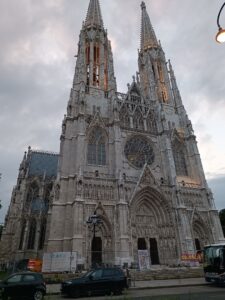
Votiv Church
© Lea Victoria Eckstein
And of course, there’s food, which is already more expensive here in Austria than in Germany. Inflation has made it even more expensive, but it was still a bit of a shock for me when I went shopping at Hofer/Aldi and spent about €50 on a normal weekly shopping trip instead of €25 (before inflation, admittedly). So, I spent about 200-250€ a month on food. All in all, I spent about 900€ a month. Then there were the leisure activities, and especially the months when visitors came, the monthly expenses were already over 1000€. All in all, Vienna is average, I would say, if you can find cheap accommodation. But the leisure activities can increase the expenses quite a bit, depending on how much you want to indulge yourself and how much you can. I also had a loan as a backup that I could fall back on. That’s something everyone must decide for themselves. Even though I would have liked to do without it altogether, I also needed the security to bridge the intermediate phases of the tertials.
3. Everyday life/internship
In March 2023, I started my journey with the DB to Vienna, whereby I planned some lead time for the bureaucratic things. I planned the registration with the city about 2 weeks before the trip and reserved an appointment. The same went for the International Office. That way, I was able to work through everything smoothly during my first few days in Vienna. I received a warm welcome from my shared flat and was able to settle into my room and explore the area very quickly.As my internship, I typically started my workday at 7am with the morning meeting. This meant I had to get up at just before 6 to get ready and get going on time. My way to work took me past Belvedere Palace, through long house canyons and across a playground to my hospital, which is integrated in the middle of a house block. There I was assigned my respective task in the morning. At the beginning, this consisted mainly of assisting in the operating theatre. But since the team was small overall, I was able to be a 1st assistant very often and learned how to sew in my time. I usually worked alone with a senior doctor at the table or also with a 2nd assistant. Otherwise, I worked on the ward and made admissions, went on rounds, helped the residents, and talked to the patients after the operation. On days when I didn’t have a fixed schedule, I was also able to go to endoscopy or special outpatient departments. Despite the small surgery, the spectrum was relatively broad because of the many affiliated doctors who came to the hospital to operate. There were orthopaedic, neurosurgical, and ophthalmic surgeries, for example, in which we worked rather subordinately. But there were also mamma operations and thyroid operations in addition to general surgery. So, I gained a relatively broad insight into surgery. Even though, of course, major operations and trauma
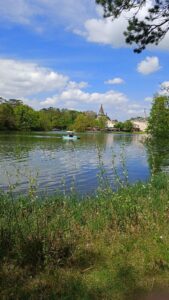
Laxenburg Castle
© Lea Victoria Eckstein
surgery were missing. However, this was made up for by the atmosphere. For me, the official end was at 1 pm plus a half-hour lunch break and 1 hour of self-study. Here in Austria, an hour of self-study is part of the working day for students. However, there were also days when I stayed longer in the operating theatre to help with an operation or to take some pictures on the ward. Afterwards, I went straight to the city or back home.
The team was very nice overall. I was integrated immediately and got my own phone, a locker and someone was always ready to explain things or let me try things out myself. In the operating theatre, the staff were very courteous and the atmosphere during the operations was relaxed to humorous, depending on the day. You could go to all the senior doctors at any time and especially to the head medical secretary in charge, who always had an open ear and with whom you could also talk about wishes for days off or holidays without any problems.
4. Free time/tips
In addition to work, there was also plenty of free time, and sightseeing was not neglected. Vienna is simply a beautiful city. Everywhere you look you see house facades with stucco or ornaments. The city simply has its very own flair. The big buildings like Sissi’s Hofburg, Schönbrunn Palace or St. Stephan’s are the most typical tourist destinations. But through my longer time in Vienna, the beautiful parks also won my attention. When winter gave way to spring, everything started to blossom and for such a big city, Vienna really has a lot of beautiful green spaces and parks all over the place. Even from my flat you had a view of a smaller park from the balcony. However, my personal highlight during my time was the Danube Island. I was particularly taken with it, because it is simply a very long island in the middle of the Danube surrounded by water and yet the big city. A piece of dysentery in the middle of the stress. It can even be reached by underground line U1 and is especially popular at weekends for cyclists, hikers, walkers, families, and students. It offers small restaurants, paved paths, access to the Danube for swimming, volleyball courts and barbecue areas. And of course, there is a lot of meadow and sunbathing areas where, in good weather, the most diverse groups spread out on blankets, but also individuals who just want to enjoy the sun. During my stay, the annual Danube Island Festival also took place where I could hear Felix Jaehn and Silbermond live. Apart from that, Vienna is just incredibly diverse. There is so much gastronomy and especially coffee houses, which are very popular and where you can eat typical Viennese specialities. The famous “Sachertorte” at Café Sacher or an Esterhazy slice at Gerstner’s? I recommend the Sacher cake at the “Hofzuckerbäckerei Demel”. It’s a little more tart and chocolaty to my taste. But everyone has their own taste:)
As for entertainment, there is so much to choose from that I often couldn’t decide what exactly I wanted to see. The many museums, but especially the theatre performances/the ballet/the musicals/the operas really appealed to me. With the Ticket Gretchen app, I was able to register as U27 and benefited from many offers and incredibly cheap tickets. For example, I was able to book a ticket for the Burgtheater and the Volksoper for €10-12 on certain dates in every seating category. I sat in the balcony with a direct view of the stage for a Shakespeare play or in the second row in front of the orchestra pit for a musical. Concerts in St. Stephan’s Basilica or dance evenings could also be attended at low cost.
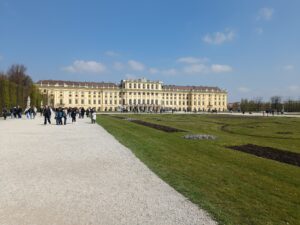
Schönbrunn Palace
© Lea Victoria Eckstein
As soon as I had visitors, I always went either to the State Opera, the Volksoper or to some other event. I wanted to experience most of the cultural offer. And it was worth it and can be recommended for anyone who is U27.
In May, the Vienna Festival Weeks started, with fairs, festivals and wine/beer festivals lined up on the weekends. There was not a weekend without a programme. And in some cases, admission was completely free, and you could just stroll through and enjoy.
5. Conclusion
Overall, I had an incredibly wonderful time in Vienna. And I would do it again every time. Both the work was fun, but also the city won me over. Seeing how summer comes to Vienna, how the parks become greener, how you can explore nature and the hiking trails in the surrounding area and still be able to enjoy the advantages of a big city with all its culinary and cultural offerings was a dream that I was able to fulfil. Thanks to the Erasmus funding, among other things, I was able to enjoy a few things without having to turn over every euro. I am very grateful for that.
My master thesis in Denmark
- Molecular and Applied Biotechnology, M.Sc.
- Denmark, Greater Copenhagen
- Technical University of Denmark

The Shakespeare caste in Helsingør, a nice destination for a day trip on the bike.
© Rebekka Horstmann - 10/2022 – 05/2023
To complete my master’s in biotechnology I was looking for a master’s thesis abroad and the Novo Nordisk Foundation Center for Biosustainability (CfB) at the Technical University of Denmark came to my attention. Denmark is well known for its thriving biotech sector and the center convinces with a strong focus on delivering more sustainable solutions for our society.
Finding accommodation in Greater Copenhagen can be challenging since not only the rent but also the deposits and prepaid rents can be a deterrent. However, student housing is in part also applicable for master thesis students at the accommodation office of DTU. While renting a studio apartment in a dorm is not necessarily the cheapest option, it makes flat hunting easier. Another common practicality is to have the moving-out date a couple of days, for example 10 working days, before the end of the lease, which is good to keep in mind.
During my stay at CfB, I was seated in an office with other master’s students, PhD students, research assistants, and a fermentation engineer which was a great chance to get very diverse input to the questions and challenges that came up along the way. In general, I experienced fairly flat hierarchies, and the openly designed workspace allowed for a lot of fruitful scientific discussions. As mandatory for an external thesis, I found examiners in Aachen before I started my project and had supervisors at the external institution. I was lucky to experience very supportive and thoughtful supervision which allowed me to develop a broad skill set. Fortunately, a Symposium was hosted at DTU on my last day, giving me the chance to present my findings on a poster and to get additional input.
Since DTU is a campus university, a lot of activities are offered in very close proximity. Therefore, it is easy to meet some other people during sports causes even with a full experimental schedule. Another part of the Danish work culture is the concept of “Friday bars”. In my center, the Friday bar was held once a month and was basically everyone gathering with a beer or soda in the canteen during the afternoon. That created a very relaxing atmosphere and gave a lot of opportunities to get to know your colleagues besides work topics as well as people from other research groups.
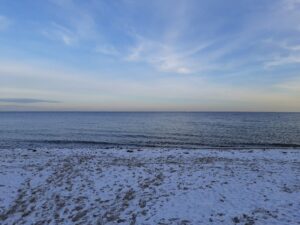
Skodsborg beach during the ice bathing season.
© Rebekka Horstmann
While written Danish is maybe not impossible to understand as a German-speaking person, spoken Danish can be quite tough. However, once you are registered in the civil registration system (and have a CPR number), the Danish government offers language courses in exchange for a deposit only. These courses are a great opportunity to meet other international students from different disciplines, have fun in practicing all the sounds in the Danish language, and of course, learn some basic Danish.
Regarding free time activities I can highly recommend to either bring or rent a bike. All across Zealand, there is a quite good network of bike lanes which is perfect to take a day trip to one of the many castles such as the so-called Shakespeare castle in Helsingør. It is also very convenient to explore the inner city of Copenhagen by bike and in most cases, you can even take it on public transport for free. As soon as the temperatures drop, you can see a lot of Danes going for an ice bath at one of the beaches which I can highly recommend giving a try.
My Research Internship at the NTNU Trondheim
- Psychology B.Sc.
- Norway, Trondheim
- Norges Teknisk-Naturvitenskapelige Universitet
- 01/2023 – 05/2023
Preparation
My path to the Research Internship at the Institute of Psychology at NTNU was surprisingly
easy. I met the head of the institute at NTNU during a guest lecture and wrote him an email
after his lecture asking about the possibility of an internship. 5 minutes later I had my

Northern lights on the way to Tromsø
© Selina Fußwinkel
acceptance and could choose my starting time flexibly. So I can at least give you a tip for an
internship at this institute: Just ask! Internships are by no means typical here, but they are
easy to implement and welcome
Traveling to Norway and Housing
I quickly found someone via Facebook who was able to take me to Trondheim by car. Even
though the journey takes longer than by plane, I can only recommend it. Especially the part
through Norway itself is very scenic and gives you a first impression of the country.
In Trondheim itself, I didn’t stay in a student dorm like most people, but in a shared flat near
the city center (Buran). This turned out to be a very good decision for me. Some of the
student dorms are further out and the bus connections at night are not particularly good,
which is why the walking distance from the city to my shared flat was often very practical. It
also gave me contact with Norwegians, which is otherwise not so easy due to the ERASMUS
bubble. Finding a flat was also very easy. The website Hybel offers a really wide range of
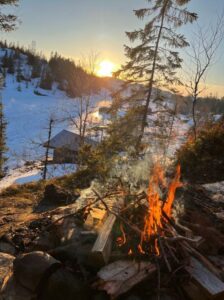
BBQ at the Mevasskoia Cabin
© Selina Fußwinkel
shared flats, which even write to you themselves. So if you prefer smaller and more personal
shared flats to student dorms, I can highly recommend it, even if it is of course a bit more
expensive. But I had a very good time with my two flatmates!
My Internship
I really enjoyed my research internship at the Institute of Psychology for the whole 5 months.
However, you have to show a lot of initiative. There are a lot of researchers working on
different projects at the institute, which were presented to me at the beginning. However, I
was completely free to decide where I wanted to work. On the one hand, this meant that I
could devote myself to the projects that I found most exciting in terms of content, but on the
other hand, it also meant that I first had to get an overview, write lots of emails and ask
where it was possible to work. So it took 1-2 weeks until I could really get started and find my
projects and tasks. After that, however, the whole thing became a no-brainer and I always
had something to do. The work itself was a lot of fun. I mainly did literature research,
analyzed data sets and co-wrote papers. If you do a good job, you’re even accepted as a co-author.
In general, I was given a lot of trust and I had a lot of freedom in my work and little
control, also meaning that if you need help, you have to communicate that directly as well. I
found this working environment and the atmosphere perfect. I was very warmly received by
the team and we had lunch together every day. I especially enjoyed the contact with the PhD
students. In summary: Super nice team, exciting content, lots of initiative needed!
I was absolutely thrilled with the university itself! There are numerous cafés, beautifully
designed study rooms and libraries (especially the library in the old building on the
Gløshaugen campus), bookstores, small supermarkets and very good (but also very
expensive) food in the canteen. Especially important: Every Wednesday is Cinnamon-Bun
Wednesday, which means cinnamon buns are available in every university café for a small
price. I haven’t missed a single one!
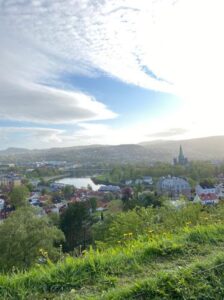
Trondheim in Summer – View von the Fortress
© Selina Fußwinkel
Daily Life in Trondheim
Trondheim is a rather manageable, small city, but very student-oriented. It didn’t take me
long to feel at home here and settle in. For students in particular, the heart of the city is the
Samfundet student house. It is run by students on a voluntary basis. Here you can find bars, a
restaurant and a café, several clubs and event rooms. You can go here every day and there is
always something going on. Parties at the weekend, concerts during the week, pub quizzes,
discussion evenings and my personal highlight: Wine-Wednesday. Apart from the student
house, however, the party life in Trondheim is rather lukewarm. If you like techno, you should
follow the Technophilia events on Facebook, as these are the only good techno parties here.
Otherwise, the bar “Circus” is highly recommended, where the music is rockier. For the
typical party nights, head to Fire Fine or Heidi’s Bierbar. In my opinion, that’s it for the
selection of good party options, so we often organized our own home parties.
Besides parties, Trondheim has a lot more to offer. The landscape with its location directly on
the fjord is beautiful. When the weather was good, we discovered barbecuing for ourselves,
either in the city by the river, at the meadows near the fortress or at Korsvika Beach. At least
once a week we went to the sauna. A particularly individual sauna can be found directly on
the coast, the Bunker Sauna. You have to heat it up yourself, though. There is also Havet.
Here you have to go at least once for the morning rave at 7 a.m., preferably on the first
Wednesday of the month, when you also get breakfast.
I also did a lot of sports here. The sports on offer are super varied and very cheap. For 120€,
you can go to the university gyms for the whole semester, attend classes here and try out all
the courses at NTNUI.
Trondheim has a lot to offer in terms of cuisine, although it is of course relatively expensive. I
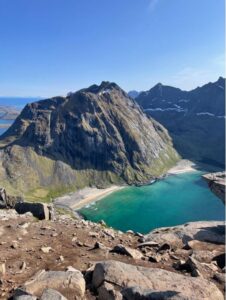
Lofoten Trip
© Selina Fußwinkel
can highly recommend the ramen restaurant “Koie”, the Olavshallen (here you can order
from 5 restaurants at once) and the pizza buffet in the Tyholt tower. It’s worth going here
anyway for the perfect view of Trondheim.
In and around Trondheim you can go hiking and skiing in winter. The Bymarka area is only
half an hour away. Here you can both hike and ski and stop at the Grønlia hut, which is
located right by the lake and offers a large selection of homemade cakes. It is also worth
taking a trip to Estenstadhytta and the Theisendammen viewpoint. The app Komoot also
offers some good routes in and around Trondheim.
As far as the weather is concerned, you really should be prepared for anything at any time in
Trondheim. The weather can change between sun, snow and rain a thousand times a day.
Sometimes you don’t see a single ray of sunshine for weeks, then suddenly it’s gloriously
summery. The darkness in winter worried me quite a lot at the beginning, because I usually
find winter in Germany terrible. And of course, it’s extremely dark and cold at the beginning,
but since everything is still very new at that time and so much is happening, there’s still no
time for tiredness and the time until it stays light a little longer passes super fast. I loved the
days when the sun didn’t set at all. The sleep rhythm gets absolutely out of balance, but
sitting in the park or on the beach at 3 a.m. in daylight is a very strange but very cool
experience.
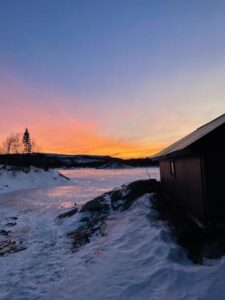
Sunset at the Heinfjordstua
© Selina Fußwinkel
Excursions and Trips
One of my personal highlights: Our cabin trips. The university owns some cabins closer and
further away from Trondheim. You can stay here very cheaply and spend great weekends. We
went on a total of 3 of these trips. The cabins are sometimes in more or less good condition,
so you shouldn’t expect luxury, but you are always directly in nature and can hike to and from
the cabins. I can really recommend going to the newly built cabin called Mevasskoia on the
other side of the fjord
We also went on a road trip to Tromsø relatively early after our arrival in February. Also, one
of my highlights. I can only recommend everyone to do this trip by car and not by plane. The
road was scenically spectacular and a unique experience. We saw the northern lights on our
first day at our first stop, and then again on the following days. We also encountered some
moose on our way. We saw a lot of the country on this trip and got to know the winter in
Norway so far north in a completely different way.
In general, I would recommend everyone to take time to travel after the end of the semester.
Great destinations are the Lofoten Islands, the numerous national parks, Ålesund, Bergen
and possibly side trips to Sweden and Denmark on the way back.
Writing my Master’s thesis in Paris
- Business Administration and Engineering: Mechanical Engineering M.Sc.
- France, Paris
- Neoen SA
- 10/2022 – 03/2023
I had the opportunity to write my external Master’s thesis at Neoen in Paris and had a very positive experience. I generally recommend gaining experience in a company, whether in your home country or abroad, just before the end of your studies, as it helped you better understand the sector and learn a lot. Neoen SA is a French company that operates in the renewable energy sector and was founded in 2008. The company is involved in the development, construction, and operation of wind, solar, and energy storage projects and is headquartered in Paris. With over 6 GW of renewable energy projects worldwide and a strong focus on sustainability and innovation, Neoen is a key player in the renewable energy sector.
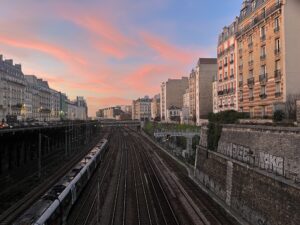
© Marie-Sophie Braun
It was much easier than I expected to find a PhD-student willing to be my responsible party from university side to supervise the thesis. None-the-less it remains a lot of extra work in terms of organization and also identification of a topic that will meet all the needs. Also, you do have to acknowledge that at some points, you will have to help out with non-thesis related tasks at the company: It will be a strong learning opportunity, but requires a lot of self-organization, especially in a foreign country.
The experience of living in France was particularly emotional for me because of a close connection to France from my childhood and family bounds. I thoroughly enjoyed the purely French environment and appreciated being able to speak the language in a work context. I do emphasize that a solid language level is a prerequisite for most of the French work environments. Even if the official language in companies could be English, I guess you could be the odd-one-out if you are the only person in the company not speaking the countries language and while it would be a problem for work-related topics, it might be difficult for a chat at the coffee machine.
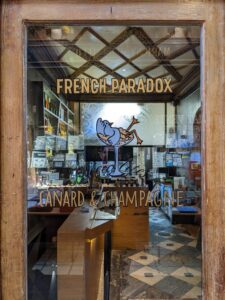
© Marie-Sophie Braun
The parisian work environment is very chic and neat. Jeans or sneaker were not seen. Guys weren’t allowed to wear polo’s at work and this will go without saying. Good clothing and good food are important in France in gereneral, I assume: This includes long breaks for lunch and an additional espresso after the meal. Even though, people are very chic, everyone was very friendly and open-minded.
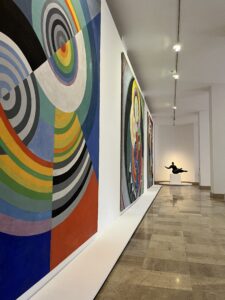
© Marie-Sophie Braun
I lived in Batignolles, in the 17th arrondissement and fell in love with the part of the city. It is a very nice, safe and friendly neigboorhood. Additionnally, I was able to get everywhere quickly by bike, which is the best means of transportation in Paris. I also recommend cultural centers (tiers lieux) and state museums, which are free for people under 26.The night life in Paris is very dense and differentiated. Depending on where you go it will be different. Less touristic parts of the city can be found for example in the 11th or 12th arrondissement and also, you should watch the sunset from the top of the parc de Belleville there. People more often meet outside then inside because appartments are small and the French terrasse-culture is very strong. In all seasons, you will find people outside and in a good mood.
In conclusion, I strongly recommend to anyone who speaks good French the opportunity to write their Master’s thesis in Paris. I had only had the best emotions. Although Paris is not a cheap city, I was able to pay the rent with the company’s expense allowance and overall had a very positive experience.
Medical internship in Lyon
- Medicine
- France, Lyon
- Université Claude Bernard Lyon 1 – Hôpital Edouard Herriot
- 10/2022 – 02/2023
Preparation:
Around 6 – 7 months in advance I started applying at university hospitals in France that had a partnership with my university in Aachen. As soon as I got the approval for a 4-month-internship at the University Claude Bernard Lyon 1 I applied for the Erasmus + traineeship programme with the support of the international office at my hometown university. Within a few weeks everything was set and I only had to take care of the needed insurances for the internship and started looking for accomodation in Lyon.
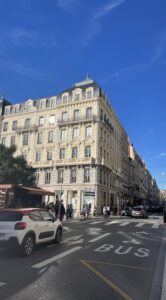
© Semiha Apaydin
Accomodation:
First of, housing in Lyon can be very frustrating. For my part I ended up doing a sort of flat-hopping. I had already heard a lot about the difficulties of finding housing in Lyon. Since I had a student status I could apply for student housing offered by the Crous but ended up not getting a spot. Therefore, I tried several months ahead to find a room in a shared flat on websites (lacartedescolocs.fr, leboncoin.fr) that people recommended in blogs. In the end I decided to text people who posted into Facebook groups about sub-letting their rooms for 1-2 months and finally ended up living in three differents apartments during my four months. This might sound very exhausting but it actually made my stay and experience very special as I got to live with different people in different parts of the city and made a lot of friends in an unique way.
Transportation:
To go to my internship and almost everywhere else in the city by metro (or bus) I had a public transport card from TCL which costs 25 Euros/month for students. Additionally, I subscribed to Velo’v bikes which were really useful when staying out late or just having an afternoon stroll along the river. Bike stops can be found everywhere in and around the city and the subscription costs 15 Euros/year.
Daily life:
As one of the biggest French cities, Lyon has a lot to offer without being too big or chaotic. Everything can be reached with the metro in less than 30 minutes and there are always events around the city. Especially if you are interested in going to museums, the cinema or the theatre, I can highly recommend the Carte Culturel for about 18 Euros which offers free or at least discounted entry fees.
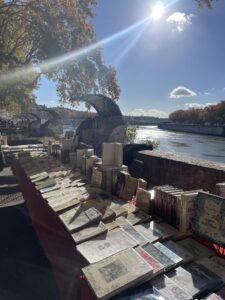
© Semiha Apaydin
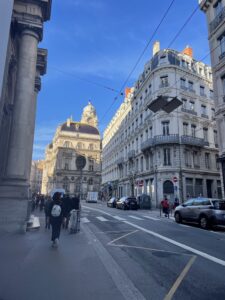
© Semiha Apaydin
On warm days everyone is meeting up at one of the two rivers or in the Parc de la Tête d’Or which was also one of my favourite spots in the city. A common thing to do after work or just with friends are Apéros which are usually just a little get-together in a bar for example. It is mostly before dinner and includes drinks and snacks.
Every day life including grocery shopping, going out for drinks or a restaurant were generally a more expensive than in Aachen. Concerning payments I always paid with my German Debit or Visa Card and barely needed cash. Also, I kept using my German mobile phone number and contract.
Additionally, it is very easy to travel around Lyon as Paris, Annecy, Nice and a lot of other pretty cities are easy to reach by train or BlaBlaCar (long-distance carpooling application) which is very popular in France.
Internship:
During my first six weeks I was in Internal Medicine. As we were only two externs (students are called externs at the hospital while residents are called interns) there was a lot to do for us. I mostly covered administrative tasks including phone calls and and preparing patient files but was also responsible for being the first one who examines newly administered patients on the unite. In the beginning I was a bit overwhelmed especially when having to do phone calls. On the other side, this helped me a lot to understand the language and speak freely in a short amount of time.
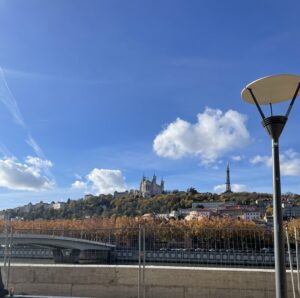
© Semiha Apaydin
I spent the followoing six weeks in Digestive Surgery. This internship was rather observatory. The interns explained a lot but I did not feel like being a great help to them as there were almost no tasks for us students. Every thursaday, the department organised a teaching session with the students and one of the doctors. Each week two students had to present a patient’s case which was then discussed.
During my last six weeks I was assigned to the department of Dermatology. Dermatology at HEH consisted mainly of accompanying a residents for the planned or emergency consultations. Every student was assigned to resident. One of my tasks was to carry out skin biopsies, this way I additinally got to work on my suturing skills.
Conclusion:
Even though I struggled a lot finding an apartment in the beginning, everything else was so easy going and made me love my stay in Lyon a lot. Lyon offers everything one could search for especially regarding cultural activities while yet not being over-crowded. Especially with it’s two rivers paired with the French enthusiasm to go out, especially after work, the city has an inviting charme that inspires for deceleration.
Internship in London
- Architecture M.Sc.
- United Kingdom, London
- Outpost
- 03/2022 – 03/2023
The following notes are a collection of my experience and recommendations of my Erasmus year in London. I’ve put them in categories to make it a bit easier to potentially find answers to your questions. I’ve tried to keep it relatively broad so it’s not all about architecture and rather a guide to navigating a year in London. More so what to expect to happen in the background rather than specific locations or events. This focuses a bit more on students going abroad and specifically to London as interns rather than students. I suspect the experience will greatly differ depending on whether or not you do your Erasmus exchange as a student or as an intern. Things like accommodation, social life and money are probably where things will differ the most, as students can apply for student housing which will be cheaper than the general housing market (obviously there will be exceptions). Furthermore you will probably have a social circle from the get go, as there will be similar minded people in your courses or even other international students. Lastly you’ll probably not earn any money as a student. Depending on your visa (obviously subject to change) you might not be allowed to work, which can make living in London a little harder.
I really hope you can gain something from this list and that the numbers won’t scare you away from going. The great thing about a big city like London is that there’s always a way to make ends meet.
Architecture internship
- Finding a studio in London can be made slightly easier by following an architectural photographer on instagram as a photographer usually has a wide range
of studios to choose from showcasing their best and most recent works - I recommend calling people to show both initiative and how proficient you are in speaking English
- Studios are usually very busy so emails might get lost
- From experience I can confidently say that to going to a smaller practice will be way more beneficial in getting the right amount of one on one mentoring, more insights into multiple RIBA – stages and better opportunities to get to know your colleagues
- For my internship I applied to multiple studios with natural building materials as that wasn’t covered in my B.SC
“Salary”
- Be aware that the Erasmus grant won’t be enough to support you in London (Probably applies to the rest of the UK as well)
- Try to get a sense of what your potential employer will be paying you to determine how much additional funds you will need
- Aim for at least 700-800 £ as a modest room in zone 2 will cost about 600£ if you are lucky (London prices probably not applicable to the rest of the UK)
- If you’re planning on commuting to work via the tube account for roughly another £150 as travel in 2022 from zone 2→ 1 was 2,50 = 5£ a day
- A British bank account might also be worth considering as a European card might entail a lot fees (I recommend Monzo for this)
- Opening a bank account requires you to have an address. Your workplace address should suffice
Phone
- If you are struggling to get a decent internet connection l can recommend giffgaff as a provider
Accommodation
Important!
If you visit London as an intern and not a student you will find it difficult to find affordable accommodation as you can’t get into student housing!
- Living in zone 2/3 is definitely more than alright & also central enough! It will be a few hundred £ cheaper than zone 1 and offer the same lifestyle
- Be aware that travelling by tube everyday can add up and it might, again, be cheaper to pay more in rent than later on in tube fees as the season tickets are way to expensive
- From personal experience finding a flat can prove to be difficult. This was probably exaggerated by the fact that I arrived in London in early 2022, right after the pandemic, the war in Ukraine and the increase in energy prices resulting in a cost of living crisis in the UK, as well as a lot of migration in London as people were priced out of their current homes and in search for cheaper alternatives
- I would not recommend staying at a hotel for even a few weeks as even the cheap ones will drain your accounts. Try Airbnb to find a longer term solution to have a place to start searching from if you haven’t had the chance to do so before coming to London
- Airbnbs can be very costly as well so try looking in zone 3 if you’re staying in London. Your commute into central might only be 15 mins longer but you will save at least a few hundred pounds per month that way.
- For reference I had to spent almost all of my Erasmus grant in the first two months of staying in London just for accommodation
- Don’t be picky and take what you can get! You can always move later as renting culture in London is very different from Germanys and people are constantly moving. Usually the rooms are already furnished as people leave their stuff behind and don’t buy new furniture.
- Renting can require references from previous landlords. Sometimes it might be beneficial to ask your Airbnb landlord or your employers to offer their contact details as a reference if your future landlord wants to check if you can make your rent on time etc.
- In terms of utilities, be mindful that living in London means having to pay council tax! Depending on which borough, how many people live together and what employment status you have the tax can range from 30 to 150£ per month. ( As a student you are exempted from having to pay council tax, but if you are an intern you might have to pay and if you live with only students you have to pay the full tax that would usually be split with all the tenant that are not students)
Activities and getting to know people
- Starting an internship places you in an unusual situation as you normally work 9-5 which makes it a little harder meeting other people in your age group as they’re usually studying, meaning they probably have a different routine/rhythm
- I found that going to the gym for classes like yoga or boxing etc. can help meeting people after work organically
- Other activities like pottery is also a great way to get creative and meet people in the area
- An app I can recommend for meeting people in a new city is Meetup. Here you can search for different activities or interests and it will recommend events around you. Be careful though and don’t meet at a park at night or sth.
- Another App I can recommend is Dice, it shows you concerts and events in your area and it lets you buy tickets securely directly through the app
- Tuesdays is usually pub quiz night which means during the evening for a small fee people can form teams and try and find the answer to a couple of questions, another great way of meeting new people and usually the prize is a couple of free rounds of drinks
Six-month internship in Vienna
- Architecture M.Sc.
- Austria, Vienna

© Amelie Schmitz
- einszueins architektur
- 10/2022 – 04/2023
Preparation:
I applied for an internship at einszueins architektur at the end of September 22 (quite late).
Fortunately, I found a few familiar faces (fellow RWTH students) on the website and therefore had a
little help to get started. A few days later, 1:1 invited me to a very open and cordial online application
meeting. Just 14 days later, I was sitting in the office and had my workplace! Since Vienna has
relatively high living costs, I applied for the ERASMUS + Internship Scholarship, which I can
recommend to everyone. Since I had already been abroad with Erasmus the semester before, I was
well acquainted with the documents and found the application process easy. You can gather your
documents spontaneously at least six weeks before the application. Therefore, it was no longer
possible for me to apply in time, so I could not get the first funding rate. After six weeks, the funding
could begin as planned.
Finding Home:
The search for a flat share in Vienna resembled what I knew from Germany. You can get far with WG-gesucht, but the rush is much higher than in Aachen. The timing of my application was quite bad, so I
had to put up with two interim tenancies (very unproblematic) for the time being. From December
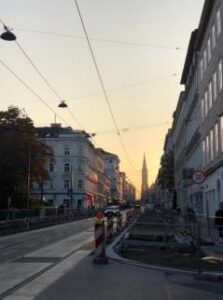
© Amelie Schmitz
onwards, I was able to stay permanently in one place. Vienna is surprisingly cheap (despite being the
capital). You can find all kinds of rooms between 300 and 600 euros. If you are looking for something
affordable, it certainly makes sense not to look in the hottest districts (e.g. 7 and 8). I lived in the 16th
district (Ottakring) and found it very cheap and lively.
Traineeship:
The internship went well, and I am glad to have been at einszueins. Due to the manageable size of 22
employees, I got to know the entire team well and quickly. The bosses attach great importance to a
good group atmosphere, which is why there is an office meeting once a week. Lunch is also freshly
cooked and eaten together in the in-house communal kitchen.
Regarding content, I helped develop a portfolio strategy for Vienna’s first non-profit housing company
and had a lot of responsibility. I was also allowed to help with the competition design for the
Zollhafen in Mainz, which we eventually won. I was understood as an equal team member and rarely
had the typical intern reputation.
Free Time:
The range of leisure activities in Vienna is enormous and varied. Especially art and culture lovers get
their money’s worth. As long as you are under 27 and a student, you can get a reduced rate on many
admission tickets. The Federal Museums Card (59,- for eight different museums) was worthwhile. I
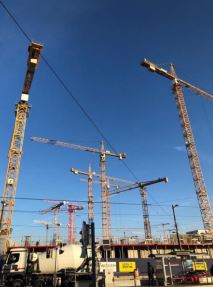
© Amelie Schmitz
attended many theatre and opera performances and various small cinemas with art house films.
Especially in spring, the city wakes up from hibernation, and it’s a lot of fun to explore the area on
foot or by bike. I often went to the Brunnenmarkt on Yppenplatz on Saturdays and enjoyed the sun
there. The Danube Canal is also a little oasis in the city. Everywhere are many authentic cafes and
restaurants where you can pass the time in a tasty way!
Transportation:
Vienna has a reasonably well-developed public transport network consisting of buses, trams, and
underground trains. I opted for the annual pass for 365 euros and canceled it after six months for a
penalty fee of about 20 euros. You get the rest of the money back to travel anywhere for roughly one
euro daily. In addition, I found the offer from the company Eddy Bike excellent. I was able to rent a
high-quality city bike there, which can also be canceled monthly (similar to Swapfiet but local). The
train connections to nearby cities such as Prague, Budapest, or Venice are well-developed and lure
you out of Austria.
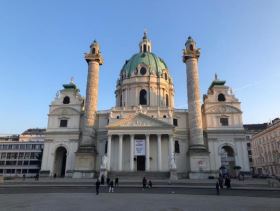
© Amelie Schmitz
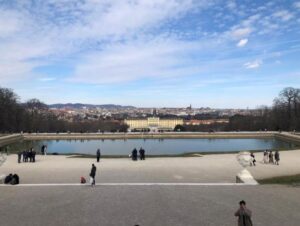
© Amelie Schmitz
Conclusion:
Vienna has proven to be a very liveable city, and I felt very comfortable there. I can imagine spending
more extended time there again or starting my career there. Unfortunately, I didn’t have enough time
to enjoy the nature around Vienna, but I’ve heard it’s also very worthwhile. I highly recommend an
internship in Austria because you have a change of scenery and get to know a different building
culture. Yet, you have hardly any language difficulties and can familiarise yourself with the new
country and working environment. To use the Erasmus+ fund makes much sense to extend the loan
of your internship.
Great experience in Norway
- Medicine
- Norway, Trondheim
- Norges Teknisk-Naturvitenskapelige Universitet
- 02/2023 – 04/2023
Introduction: My Erasmus+ traineeship experience of two months at the Department of Biomedical Laboratory Science at NTNU in Norway was a great experience, personally and professionally. This report aims to provide an overview of my journey, including the application process, accommodation, work environment, and the many activities that can be undertaken in Norway.
Application Process: I found a fascinating paper from the Department of Biomedical Laboratory Science and decided to apply for an internship. First, I called the department to ask about the possibility of an internship. Second, I submitted my application via mail in November. In January, I received a response from the university indicating the need to complete an online application. The whole process was straightforward if you followed the university’s instructions.
Accommodation: Finding accommodation in Norway was relatively easy. Sit, the Studierendenwerk of the NTNU, offers housing to all students (also Erasmus+ Traineeship Students). The rent was affordable, approximately 450 euros, especially when compared to other expenses in the country. Sit provides a range of student housing facilities throughout the city. After being offered a room in Steinan, I asked for a room in Moholt as I had friends from Aachen living there. The staff at Sit is very friendly and changed my offer. In Moholt, there are two types of accommodations: flats for four people with a shared kitchen and bathroom, or “the towers,” where 15 individuals share a kitchen, each having their own bathroom. I recommend “the towers” as they are newly constructed and offer fully equipped kitchens.
Transportation: Trondheim’s bus system is well-planned and provides convenient transportation options throughout the city. The busses come all 10 minutes, later in the day all 20 min. But with 50 euros per month, it is also costly.
Work Environment: On my first day, I received my key card, office key, and an office equipped with a second screen and a work laptop. Although usually an office is shared among three people, the office was mainly only used by me. The work culture in Norwegian labs and the hospital generally is more casual than in Germany. The hierarchy is flatter. For example, everyone gathered for coffee in the morning and had lunch together. Lunch is already at 11:30. I recommend bringing your lunch. That’s also what most others do, as food is expensive. My supervisors ensured that I was trained in every method before I had to work independently. I experienced a high level of appreciation for my work. I was very flexible in planning my lab week, which was cool!
Leisure time: Norway offers a wide variety of (outdoor) activities. If you’re a skiing enthusiast, Trondheim’s cross-country loipes are a must-do, and if you prefer alpine skiing, Vassfjellet is a good destination, located just 30 minutes by car or 60 minutes by bus from Trondheim. Of course, hiking is another great option to enjoy the landscape. Additionally, the university offers mountain cabins for rent (NTNU I member: 4 euros per person per night/ non-member: 8 euros pp pn). Boomerang and BUA are two spots where you can rent outdoor/sports equipment (cross-country ski, snowshoes, sleeping bag, tents, …) for free. If you prefer indoor activities, Sit has several gyms all over the city. There you can train by yourself or book courses. A spot can always be booked 48 h in advance; therefore, you can try out different ones. Apart from the gyms, you can book cheap Squash courts and go bouldering.
Conclusion: I recommend an internship in the Department of Biomedical Laboratory Science at the Faculty of Natural Sciences. The combination of friendly colleagues, a good work environment, and a wonderful country make it a great experience.
Writing my thesis at the Imperial College London
- Chemical Engineering M. Sc.
- United Kingdom, London
- Imperial College London
- 10/2022 – 04/2023
Preparation
Preparing for my time in London was simultaneously very easy and very stressful. For context I had 2.5 months time between my acceptance to the Erasmus scholarship and ICL and the beginning of my time in the UK. For most topics, such as getting a visa, finding a RWTH advisor, getting to London, etc. it was fairly simple to organize every thing. The most difficult task was in fact finding an apartment in London. As this probably takes the most amount of effort, I will start here.
Put simply, the London housing market is very expensive and the number of people searching for apartments seems to far outweigh the number of apartments available. Depending on the location and the size of the room, apartments seem to typically cost between £700-1200 per month, with the average being around £860 based on what I saw and heard from others. I had the most success finding an apartment via the websites Spareroom and Spotahome . If you already have a bachelors degree, Gradpad is another good place to look for apartments. The best method is to start messaging potential landlords early and to try and not be too picky with the offers you get. Many landlords are flooded with requests and will frequently not answer. In such a large city, it is normal to have a commute of 20-30+ minutes to the university, but due to the great public transport, living farther away from the campus should not be too much of a problem. The ICL campus I was located in is found in South Kensington, so I would base my search in the surrounding boroughs (districts). A cheap way to get to university is to take a bike, and the tube is also always a viable (although somewhat expensive) option.
I lived in Battersea and took a bike to and from university everyday which worked really well for me, although cycling in London is not quite as comfortable as cycling in Aachen.
For the duration of my stay, I was informed by the ICL International Student office that I needed to enter the UK under a standard visitor visa which allows a student to study in the UK for a period of up to 6 months. As a EU citizen and German national, I was not required to go through any formal applications or receive any formal documentation as there is an agreement which allows EU citizens to enter the UK as standard visitors without a visa.
Filling out the Traineeship agreement was fairly simple, I wrote a draft version for the agreement myself which I believed best fulfilled the requirements and sent this to both my RWTH and ICL advisors. I would recommend do this yourself and then possibly correcting the agreement as opposed to waiting for this to be done by someone else.
Finding an internal RWTH advisor was done by getting in contact with the Erasmus team from my institute (AVT). I then sent a description of the work which I wanted to do at the ICL (which had been agreed upon with my ICL advisor) and then a suitable advisor was found.
Arrival
Getting to London is fairly simple. There are a large number of airports to fly to, although it is likely the most comfortable to fly to London Heathrow. If you want to take a train, there is also a good train connection to get to London from Aachen. I personally drove my car to London via a ferry from Calais to Dover which allowed me to take a few more things with. This was also surprisingly easy. Important if you choose to drive in London: there is an Ultra Low Emission Zone for which you need to pay to be allowed to drive in London. By simply googling the Ultra Low Emission Zone and how to pay for it, you can save yourself from being fined. As usual with any sort of travel booking earlier is always better.
Living in London
London is a wonderful city to live in full of exciting things to do. No matter what it is you want to do, there is guaranteed to be at least 3 different places where you will be able to do it. There are a lot of opportunities to go out during the day or in the evenings with your friends. Sports, bars, clubs, museums, parks, the list goes on and on. Three things I personally took advantage of were the great selections of musicals that you can visit for a relatively affordable price, the great salsa/bachata dancing scene, and the wonderful green parks. However, being such a large city with so many things to do also means that traveling between locations often takes a significant amount of time (I felt like everything was always at least 25-30 minutes away from wherever I was). My way with dealing with this was to ride a bike between locations and then jump on the tube as necessary. Riding a bike in London requires a certain amount of confidence in your biking skills. The drivers in London are not very good and they tend to pay less attention/respect to cyclists than in Germany. So people won’t be running you over, but you also should be confident in taking space as it is available. Otherwise cars will try to squeeze by you which can become dangerous. That being said, the city is always improving for cyclists and there now exist a number of bike lanes which significantly improved the safety of riding through the city. I rented my bike from Swapfiets which was a great deal for just £19 per month with all repairs etc included, however there are also many Santander rental bike stations spread across the city with which you can also travel.
My impression of living in London is that the city has a lot to offer, and it is up to you to take advantage of it. I was almost always busy thing evening plans. But if you don’t actively look for things you want to do and make plans to do them, then London can quickly become a oversized and anonymous city which is not the best to live in.
Studying at ICL
As a Master’s student writing my master’s thesis, I was left with a lot of independence on how I wanted to study at the ICL. I worked in the Sargent Center for Process Systems Engineering and I was immediately integrated into the center as one of many other researchers. PhDs in the center work in large office spaces with individual desks, which gives a nice mix between social interaction amongst colleagues and still the privacy of your own work space. I was treated no differently from a PhD student and had my own desk from which I could work.
Being at a foreign institute, you are forced to take a lot of responsibility and initiative into your own hands. The professors at the ICL are some of the best in their fields, however they are busy people and expect you to be able to make steady independent progress. I had a weekly-biweekly meeting with my advisor where I could show my progress and get input on problems I was having. But as one would expect of a Masters student nearing the end of their degree, it is mostly up to you to solve small problems and come up with the direction of your work. I found this style of advising similar to my experiences in Aachen, so I do believe that RWTH students are well prepared for this style of work.
It’s important to keep an eye on what you need to do for the RWTH, such as the Erfassungbogen, etc. as the professors in Imperial will likely not know about these things and you will have to help shape your thesis so that it still fill the expectations of the RWTH.
Final Impressions
Overall I absolutely loved my time in London. Imperial is a world renowned university and things I learned have certainly helped me develop in new ways beyond what I learned in Aachen. I would highly recommend anyone thinking about traveling to London and the Imperial college to do so.
Consulting internship in Vienna
- Electrical Engineering and Business Administration M.Sc.
- Austria, Vienna
- Capgemini Consulting Österreich
- 10/2022 – 02/2023
Motivation and formalities: Before writing my thesis, I wanted to take the chance to get to know another business sector and to experience what it’s like to live in the beautiful city of Vienna. Therefore, I applied for a consulting internship at Capgemini Invent. The application process was very quick and the colleagues I met in the process gave me a very good impression of the work culture and lifestyle in consulting. Since I am not European, I needed a work visa, which is theoretically easy to get if you do an Erasmus internship. Unfortunately, the administrative department of the company had no experience with Erasmus interns, so I had to do a lot of research and contact many institutions.
Preparation: I started preparing four months before the start of my internship, and the time was just enough. In my case, the most difficult part was getting the work permit, but in general I would say that after accepting the internship offer, the only thing you have to prepare is the accommodation. I looked for a shared apartment in WG-Gesuch because I didn’t know many people in Vienna. I was very lucky to find a very friendly, open and helpful flatmate. The apartment was very modern and spacious and was located in the 16th district and very well connected to the office, but also to the city center and only 10-15 minutes away from my favorite cafes and bars in the 7th district. To get there, I took the night train from Aachen to Wien Meidling Bahnhof (and then the subway to the apartment) 10 days before my first day of work, so I could settle in well in Vienna. I can only recommend this, because during this time I was able to enjoy the warm September days, take care of some organizational things, get to know my flatmate better and meet people who are now very good friends of mine.
- Internship Search: I found the internship through LinkedIn and didn’t apply to anyone else because they got back to me very quickly and made a very good first impression.
- Apartment search: Via WG-Gesucht. I would 100% recommend a WG. I have also heard of other search portals like housing anywhere or willhaben. There are also accommodations in the STUWO dorms and many private and very modern student apartments.
- Phone or bank/account opening: Was not needed.
Formalities on site:
- Health insurance: My colleagues and I were automatically insured by ÖGK. For the insurance card, I had to submit a photo and it was delivered to my apartment. I then went to the general practitioner with the card. That worked very well.
- Everyone has to register their address and also deregister when they move out.
Everyday life/leisure: The five months in Vienna were a wonderful experience. Since I arrived at the end of September, I was able to do some wine hikes at Wilhelmina Berg, Kahlenberg and Nussberg. As well as a grills and chillings by the Danube. In the colder months my friends and I spend time in various museums (recommend the long night of museums; Mumok, Albertina, Albertina Modern, Leopold and the Kunsthistorisches Museum), bars (Monami, Café Anno, Prosecco Bar, Liebling), cafes (Ramasuri, Wirr, Ulrich & Erich), exhibitions, small concerts, pop up vintage stores and the Naschmarkt.
I can also recommend a visit to the ballet, the opera, a musical and a Christmas concert. During the Christmas season, there is a Christmas market on almost every corner. My favorite is the one at Spittelberg, but the Christmas market at Spittelberg and the one at Schönbrunn are also worth a visit or two. You also have to keep in mind that during the week I could only go out for dinner or drinks because I worked around 50 hours a week, but on the weekends I could enjoy everything Vienna has to offer. As for sports, my flatmate, some friends and I were members of “myClubs” (like Urban Sports in Germany) and could visit many different studios in the city. Another option is to sign up for university sports classes (USI).
- Going Out: There are many cheap and also fancy bars around Schwedensplatz and also in the 6th, 7th and 8th district. My favorites are the ones mentioned above. For live music, there are many bars on the “Gürtel”. For partying, my favorite clubs are Grelle Forelle (mostly techno) and Volksgarten (eclectic and mostly commercial music), but there are many others (Pratersauna, Praterdom, O Club, VIP, etc.). I’ve been to Vienna in the colder months, but I’ve heard there are lots of raves and outdoor parties in the summer.
- Culture shock: Only positive things! My flatmate was very welcoming and introduced me to her friends. At work, everyone was also very friendly and we did many activities together outside of the office. There were many new young co-workers like me, so it developed into a nice friendship. At a salsa night, I met some Erasmus students with whom we explored the city together and created unforgettable memories. I hope to see them again soon!


